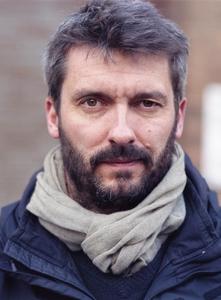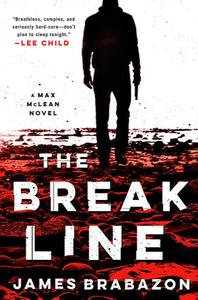
|
|
| photo: Hanna Jedrosz | |
James Brabazon is an author, journalist and documentary filmmaker who lives in the U.K. He has traveled to more than 70 countries, investigating, filming and directing in the world's most hostile environments. He is the author of The Break Line (Berkley, January 29, 2019) as well as All Fall Down and My Friend the Mercenary, a memoir recounting his experiences of the Liberian civil war and the Equatorial Guinea coup plot.
On your nightstand now:
The Violins of Saint-Jacques--Patrick Leigh Fermor's only novel. He gave me a copy ("something for the Istanbul bus journey") after I stayed with him at his house in Greece in 1991. It's a perfect picture of a world teetering on the edge of extinction--an allegory, perhaps, of the pre-War Europe he'd traveled through and written about and which, like the fictional island of Saint-Jacques, was destined to vanish forever.
Favorite book when you were a child:
Danny, the Champion of the World by Roald Dahl. I loved this book so much that I insisted my mum call me Danny! It's about a world where it's okay to break the law if there is a moral reason to do so--a strong motif in The Break Line.
Your top five authors:
This changes regularly! But today it's Joseph Conrad, Michael Ondaatje, Ernest Hemingway, Laurie Lee, John of Patmos.
Book you've faked reading:
Our Mutual Friend by Charles Dickens. It was a set text for my English Literature exam when I was 18. I could not stand Dickens and still can't. I read the crib notes. Dull. Dull. Dull.
Book you're an evangelist for:
In the Skin of a Lion by Michael Ondaatje. It is very hard to describe what this book means to me, because it feels like an experience that I have lived and not read and which I remember as fragments of a dream. A spellbinding prose-poem and gritty, magical ode to a lost generation of anonymous migrant workers who built Toronto in the 1930s, it's a masterpiece of changing perspectives, the transformation of identity and the revelation of whole lives lived on the ragged margins of society. It is the most perfect story I have ever read by one of the greatest living authors, and the one that has influenced most what and why I write.
 Book you've bought for the cover:
Book you've bought for the cover:
The 2010 Penguin Modern Classics edition of John le Carré's The Spy Who Came in from the Cold.
Book you hid from your parents:
Paul Verlaine, Femmes et Hombres. Transgressive and viscerally sexual, Verlaine's poetry revealed another way of living. Trust me, aged 17, I could not WAIT to get to Paris.
Book that changed your life:
Heart of Darkness, a novella by Joseph Conrad. It's a stunning, horrific, relentlessly compelling and above all searingly truthful account of the moral bankruptcy of European imperialism in Africa--and one that has in turn been accused (falsely, in my estimation) of being racist itself. Based on Conrad's own personal experiences in the Congo, it expresses a profound outrage at man's inhumanity to man that is at once authentic and simultaneously entertaining, which is in itself brutal. Heart of Darkness neither cajoles nor sermonises: it draws you in and makes you an accomplice to the abomination. Its power lies in making the reader question their own assumptions and imperatives, which is at best uncomfortable and at worst devastating. It was the first book that made me cry.
Favorite line from a book:
"Because we don't know when we will die, we get to think of life as an inexhaustible well. Yet everything happens only a certain number of times, and a very small number really. How many more times will you remember a certain afternoon of your childhood, an afternoon that is so deeply a part of your being that you can't even conceive of your life without it? Perhaps four, five times more, perhaps not even that. How many more times will you watch the full moon rise? Perhaps 20. And yet it all seems limitless." --Paul Bowles, The Sheltering Sky
Five books you'll never part with:
The Church Cat Abroad by Graham Oakley--my favourite book as a small child.
Mosquito Intruder by Dave McIntosh--41 seat-of-your-pants night raids over occupied Germany. My best friend gave it to me for my 11th birthday.
The Good News Bible, given to me when I left primary school, and signed by everyone in my class.
The Whitsun Weddings by Philip Larkin--covered in my pencil-scrawled notes from studying the poems at school.
The Sheltering Sky by Paul Bowles. I have a battered old Flamingo Modern Classic, published when Bowles was still living in Tangier. Neither the copy nor the edition is remarkable: but the book changed the way I thought about all literature.
Book you most want to read again for the first time:
Conrad's War by Andrew Davies. Along with Danny, the Champion of the World, this book taught me what a novel should be, and what it could do--namely, fire the imagination of the reader so vigorously that it leaves you caught between inspiration and exhaustion.
Best book you haven't read:
The Old Man and the Sea by Ernest Hemingway. I'm holding out as long as I can before I read it. The thought that there won't be any more Hemingway novels to read is a prospect too bleak to consider.

